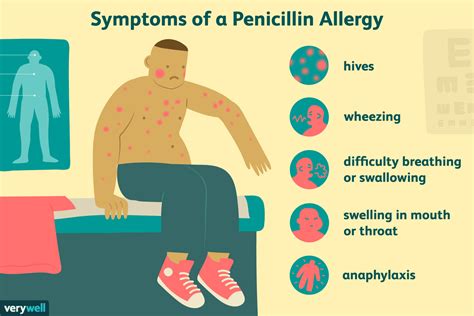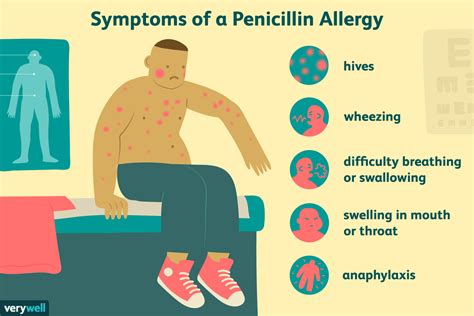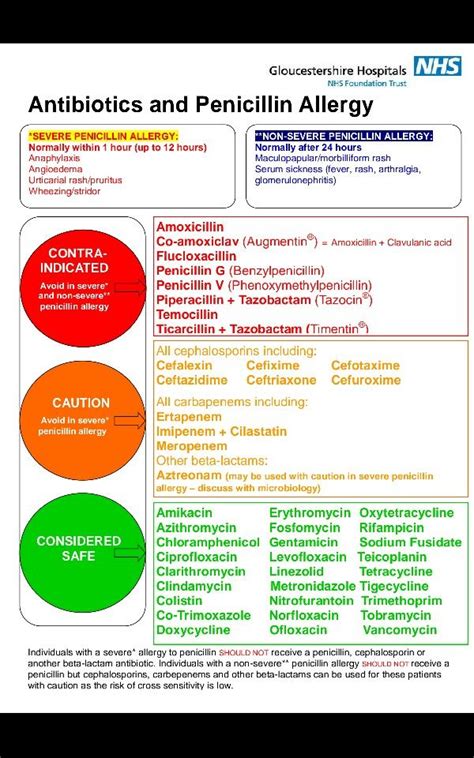Intro
Penicillin is one of the most commonly prescribed antibiotics, used to treat a wide range of bacterial infections. However, some individuals may be allergic to penicillin, which can cause a range of symptoms, from mild to severe. Allergies to penicillin can be a significant concern, as they can impact treatment options and increase the risk of adverse reactions. In this article, we will delve into the world of penicillin allergies, exploring the causes, symptoms, diagnosis, and treatment options available.
The importance of understanding penicillin allergies cannot be overstated. With the rise of antibiotic resistance, it is crucial to use antibiotics judiciously and ensure that patients receive the most effective treatment for their condition. A penicillin allergy can limit treatment options, making it essential to accurately diagnose and manage these allergies. Furthermore, a penicillin allergy can also increase the risk of adverse reactions, which can be life-threatening in severe cases.
Penicillin allergies can be confusing, and many individuals may be unsure if they are truly allergic or not. Some people may have experienced a side effect or reaction to penicillin in the past, but this does not necessarily mean they are allergic. It is essential to understand the difference between a side effect and an allergic reaction, as this can impact treatment decisions and patient safety. In the following sections, we will explore the causes, symptoms, and diagnosis of penicillin allergies, providing readers with a comprehensive understanding of this complex topic.
What is a Penicillin Allergy?

Causes of Penicillin Allergies
Penicillin allergies are often caused by a genetic predisposition, although the exact mechanisms are not fully understood. Some research suggests that penicillin allergies may be linked to a genetic variation in the HLA gene, which plays a crucial role in the immune system. Additionally, individuals with a family history of penicillin allergies may be more likely to develop an allergy themselves.Symptoms of a Penicillin Allergy

In severe cases, a penicillin allergy can cause anaphylaxis, which can be life-threatening. Anaphylaxis symptoms include:
- Constriction of the airways, leading to difficulty breathing
- Rapid heartbeat or palpitations
- Dizziness or fainting
- Confusion or loss of consciousness
Diagnosing a Penicillin Allergy
Diagnosing a penicillin allergy can be challenging, as the symptoms can be similar to those of other conditions. A healthcare professional will typically use a combination of medical history, physical examination, and diagnostic tests to determine if an individual has a penicillin allergy.Some common diagnostic tests include:
- Skin prick test: This test involves placing a small amount of penicillin on the skin and observing the reaction.
- Blood tests: These tests measure the levels of allergy-related antibodies in the blood.
- Oral challenge: This test involves administering a small dose of penicillin and monitoring the individual's response.
Treatment Options for Penicillin Allergies

In some cases, individuals with a penicillin allergy may be able to undergo desensitization, a process that involves gradually introducing small amounts of penicillin to the body to build up tolerance. This can be a complex and time-consuming process, requiring close medical supervision.
Alternative Antibiotics for Penicillin Allergies
For individuals with a penicillin allergy, alternative antibiotics may be prescribed. Some common alternatives include: * Cephalosporins: These antibiotics are similar to penicillin but have a different chemical structure. * Macrolides: These antibiotics, such as erythromycin and azithromycin, are often used to treat respiratory and skin infections. * Fluoroquinolones: These antibiotics, such as ciprofloxacin and levofloxacin, are often used to treat urinary and respiratory infections.Preventing Penicillin Allergies

Living with a Penicillin Allergy
Living with a penicillin allergy can be challenging, but there are steps that can be taken to manage the condition. These include: * Carrying an EpiPen or other emergency medication at all times * Wearing a medical alert bracelet or carrying a card with allergy information * Informing healthcare providers and pharmacists of the allergy * Avoiding medications that contain penicillin or similar ingredientsConclusion and Next Steps

We invite you to share your thoughts and experiences with penicillin allergies in the comments below. Have you or a loved one been diagnosed with a penicillin allergy? What steps have you taken to manage the condition? Your insights and stories can help others better understand and navigate this complex topic.
What is the most common symptom of a penicillin allergy?
+The most common symptom of a penicillin allergy is hives or itchy skin, although symptoms can vary widely depending on the individual and the severity of the reaction.
Can I still take penicillin if I have a penicillin allergy?
+No, if you have a penicillin allergy, it is not recommended to take penicillin or any medications that contain penicillin or similar ingredients. This can increase the risk of a severe allergic reaction, including anaphylaxis.
How can I prevent a penicillin allergy?
+While it is not possible to completely prevent a penicillin allergy, using antibiotics judiciously and only when necessary can minimize the risk. Additionally, ensuring that patients are aware of their allergy status and carry an EpiPen or other emergency medication can help prevent severe reactions.
